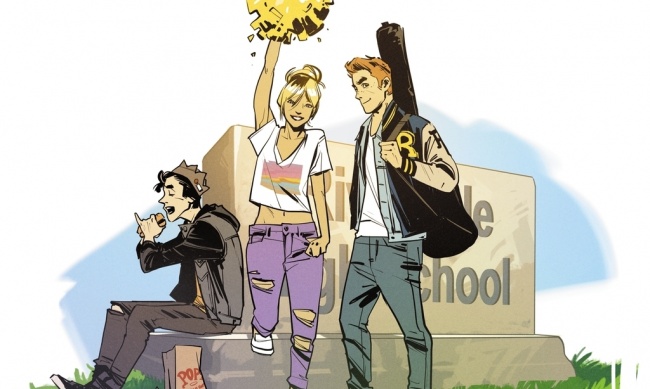Over the weekend, Archie Comics withdrew the Kickstarter the company launched earlier in the week to raise additional funds to put out some of its rebooted titles. The Kickstarter drew criticism from the get-go, with many fans wondering why an established, household-name publisher would turn to crowdfunding for a commercially-viable, mainstream project.
If you consider crowdfunding to be synonymous with Kickstarter and similar platforms, that’s a valid question. Crowdfunding as we know it today was created to aggregate popular support for projects that probably would not get made through traditional channels, or to support creators who have no other obvious way to monetize activities that benefit their fans, not support big company initiatives.
Kickstarter, Patreon, GoFundMe IndieGoGo and the rest have proven good enough at this task to establish a potential income stream for creators during a very tough economic moment, and that’s nothing to sneeze at.
But they’re not really industrial strength. That’s not a criticism; it’s how they are designed. The fact that a platform like Kickstarter can be, and has been, used to fund big institutional projects from time to time does not mean it should be used like that routinely. To the extent Archie’s critics were making that point, they are entirely correct.
Kick them while they’re down. Kickstarter itself has several big shortcomings. The biggest is lack of accountability. Funders of projects have no practical recourse if projects don’t deliver on time, on spec, or at all. That’s bad enough when the occasional artist drops the ball, but it’s a recipe for systematic abuse in the hands of a large company.
There’s also an element of bad faith when a company that has been set up organizationally and financially to take on the risks of the mainstream publishing model in order to reap rewards at scale, then turns around and outsources the risk of a project’s success to fans while pocketing the same profits.
This is not to say that Archie would have been guilty of either of those things. CEO Jon Goldwater’s frankness and transparency in the past week indicate that at worst, they were just trying to push the envelope a little bit too much in an honest effort to innovate their way out of a financial jam. It was a short step beyond what Fantagraphics did in 2013, and it turned out to be just a step too far.
Change the channel. The other big objection to Archie’s Kickstarter is that it threatened to cut retailers out of the picture on books that are clearly aimed at the Direct Market customer base. Again, Goldwater stated this was not the intention of the project. It’s just an unavoidable byproduct of the Kickstarter model.
This actually points to a larger problem. Almost all the existing crowdfunding platforms leave fulfillment to the project producer. If the Kickstarter funds a larger production run than is needed to repay backers, distribution is left to the individual as well.
How many great projects are delayed in shipment because the creators are slow at packing boxes? And how many never get the broader exposure they deserve because there is no built-in mechanism in the platform to help people take them to market?
Evolve the crowd. For years we’ve understood what a crowdsourcing solution for comics publishing would look like. IVerse Media even announced one a few years ago, but it never got off the ground. The main elements should include:
- Real accountability, perhaps by melding Kickstarter’s project-based approach with Patreon’s model of releasing funds incrementally as milestones are hit. Established publishers might need to come up with matching funds in escrow or something else to cover their bets and increase confidence.
- Funding transparency. It’s likely that publishers would quickly find that asking fans for money up front comes with some strings attached, including demonstrating greater fairness to the creators driving the project.
- Fulfillment and distribution support. If the platform is built specifically for comics, it could incorporate technology to communicate with Diamond and Amazon/comiXology’s systems to streamline distribution through the two largest direct physical and digital channels. Or, it could integrate with the publishers’ own system so that crowdfunded projects could be managed through the same processes as everything else the publishers are doing.
- Retailer involvement. The Direct Market is more than a distribution channel: it’s a ready-made set of communities (one at each store) whose dynamics can be marshalled in all kinds of interesting ways to aggregate fan support for different projects. Imagine funding competitions, where the retailers whose customers generate the most support get delivery a week early. There are plenty of ideas that could get retailers, publishers, creators and fans all pulling on the same side instead of engaging in a lose-lose tug of war.
Turning publishing inside out. Crowdfunding today is a really interesting stopgap, a food bank in the midst of the devastation that digital transformation has inflicted on the creative class, with occasional unintended benefits for larger projects and publishers who can slip into the chow line once in a while.
With a little more imagination, it could become something much more: a mechanism for making publishing more stable and less risky, more responsive to the fan community, fairer to creators and able to capitalize on the real value that retailers and the Direct Market bring.
Archie didn’t fail at Kickstarter. Kickstarter, as it exists today, failed Archie. Time for someone to step up and succeed.
--Rob Salkowitz (@robsalk) is the author of Comic-Con and the Business of Pop Culture.
The opinions expressed in this column are solely those of the writer, and do not necessarily reflect the views of the editorial staff of ICv2.com.




